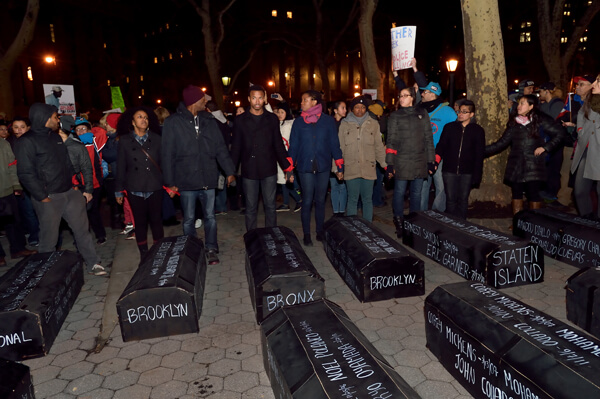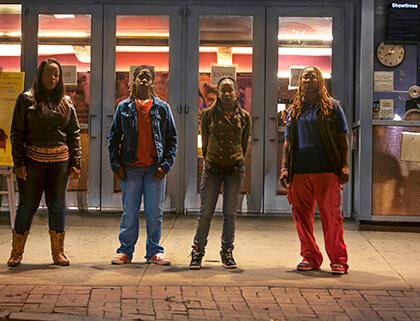More than four months after the suspicious death of a 26-year-old Black transgender woman in Newark, the victim’s family and local advocates are seeking answers and demanding justice for a woman they described as a hard-working, aspirational individual who had hopes and dreams.
Ashley Moore was found dead on April 1 outside of the Newark YMCA, where she was renting a room. Police who were initially on the scene said she was found face-down on her stomach, had rope or wire abrasions on her legs, and suffered rectal bleeding, according to Moore’s mother, Starlet Carbins, who spoke about her daughter’s death in a Zoom interview with podcast host Jasmin Singer (see below, following this story). Moore’s neck and legs were “grossly swollen and disfigured,” Carbins said.
Yet, Carbins said she was told something entirely different by a detective who spoke to a doctor at Newark University Hospital, which was where her daughter was transported once her body was discovered. According to the detective, the doctor said Moore appeared to have died by vehicular impact.
However, the same detective would eventually go on to tell Carbins that her daughter died after suffering the impact of a long fall.
When Gay City News contacted Newark police to learn about the status of the case, there were a range of responses. A spokesperson first said on August 10 that the “death investigation is continuing as police await final cause from the medical examiner. At this time, the investigation is not involving a homicide.”
Nine days later, on August 19, the same police department said in an email that Newark’s Public Safety director Anthony Ambrose asked the Essex County prosecutor to review the case. Minutes later, Ambrose himself emailed, saying, “It was ruled a suicide by the medical examiner” and “at my request the Essex County prosecutor is reviewing.”
Advocates remain wary of any sort of swift conclusion to the case after they have heard different stories but also noted general police inaction in response to the case. Carbins did not find out about her daughter’s death for nine days — and she didn’t learn the news from the police.
“I found out Ashley had died via Facebook,” Carbins, a visiting nurse who was in Vermont at the time, said during that Zoom interview. “All the information I obtained I got on my own. No one contacted me to let me know that my child was dead…”
She added, “So I found out through Ashley’s friends and social media contacts via her social media and Instagram exactly what they knew, which wasn’t a lot, but at least it started me on a path to reach out to individuals.”
Carbins, who given her work as a visiting nurse was unavailable to speak with Gay City News, is not the only one who views Moore’s death with suspicion. The Newark LGBTQ Center’s executive director, Beatrice Simpkins, spoke to Gay City News on August 18 and described Moore’s case as one that has been laced with inconsistencies and contradictions.
Simpkins expressed shock that she was never informed of Moore’s death and voiced her unhappiness at the fact that the police never told Carbins. Had Simpkins known, she could have informed the local LGBTQ community, which could have led to new information about the case.
“[Carbins] had no crime report, no cause of death, had no idea what happened to her child,” Simpkins explained. “And so we stepped in to advocate on behalf of the family and Ashley to find out what happened and make sure it was investigated. The family needed to be treated with more respect by the police department and we thought they owed her an apology.”
Simpkins noted that she has been assisting efforts to train members of Newark’s police department as part of the department’s consent decree with the US Department of Justice that was brought on by poor policing practices, including the department’s interactions with the LGBTQ community.
She has worked with the department for two years, creating a level of familiarity that would seemingly make it a no-brainer for authorities to notify her of any such incident. However, she said LGBTQ liaisons in the police department were not initially aware of Moore’s death.
“Not only were they not telling us, they weren’t speaking to their own internal process because those officers should have known a Black trans woman was found dead in the streets of Newark and informed the LGBT community to help connect police to her family and support her family,” Simpkins said.
Carbins and Simpkins worked in tandem to amplify the case and secured a meeting with Newark Mayor Ras Baraka, whom Simpkins said was receptive to their concerns and agreed that the case had been mismanaged by local authorities.
Simpkins said that though the Newark police opted to describe Moore’s death as a suicide before handing it over to the Essex County prosecutor’s office, the case was assigned to the prosecutor’s homicide squad. The Essex County prosecutor’s office did not return multiple calls and voice mails on August 18 and 19 seeking information about the status of the case.
Numerous questions remain, including the official cause of death that will be included on Moore’s death certificate. Simpkins said the coroner pressured Carbins to cremate her daughter’s body due to the overwhelming amount of bodies that were arriving at the height of the coronavirus pandemic, and the death certificate still says “pending.” Simpkins said the State Medical Examiner is now looking into how the coroner handled the body, why there were demands for cremation, and why it took so long for an autopsy on Moore.
“How can you cremate a body when you don’t know for sure why the person died? Why does the death certificate say pending? That shows a contradiction,” Simpkins said.
A spokesperson for the New Jersey Northern Regional Medical Examiner’s Office acknowledged receiving an email August 19 seeking clarification on those details and any further information about the status of Moore’s case, but did not follow up with any response. The state’s Medical Examiner’s Office also did not return phone calls on August 19, but an official with the New Jersey Department of Health told the newspaper that a request would need to be filed under the state’s Open Public Records Act to get information from the state Medical Examiner’s Office.
Regardless of the cause of death, Simpkins and other advocates are also calling on the YMCA for answers and changes. The facility has served as a homeless shelter for marginalized communities and Simpkins wonders why, considering the vulnerability of that population, anyone would have access to the roof.
“It was reported in the police report that they let people go to the roof to smoke, and the roof is not enclosed,” Simpkins said. “So the Y has some things to answer for and we are going to press the Y about that.”
“[Authorities] sent us the incident report, but there was a whole investigation done where they did interview witnesses, found out some info about Ashley’s activities the past couple months, how she’s been behaving, some commentary about maybe she was having difficulties,” Simpkins said. “But no one really knew how she wound up on the sidewalk outside the building… the presumption is she jumped from the roof.”
Simpkins is also wondering about a series of other questions as she continues to examine the case. If Moore was indeed on the roof of the YMCA, was she the only one there? Simpkins also wonders about the ligature marks she had on her body.
“I asked if they took a rape kit and they said they didn’t.”
Simpkins has asked the mayor’s office, police department, the state and local medical examiners, and the YMCA to “preserve and protect” all video evidence, interviews, documents, and any other information related to Moore.
“If there was a possible crime, we want to make sure that evidence is still available,” she said.
Newark’s YMCA did not immediately respond to a request for comment on Moore’s death.
The inaction of the police department is worth noting in the context of another incident Moore encountered in the past. She published an Instagram post in 2018 when she called police to report that she had been mugged. Upon notifying police that she was a Black transgender woman, she said cops made a derogatory remarks about her gender identity and never helped her.
“The lady denied me and called me a disgusting fag so I didn’t get help there,” Moore said in the video she posted in July of 2018. “I called again and I got a male. He also denied me; didn’t call me any names, just denied me… I went to the police station and it’s kind of empty. I talked to one police officer and he didn’t want to help me either.”
Simpkins brought up that Instagram post and cited it as yet another example of the issues that have persisted among law enforcement officers in the city.
“There is a problem in the culture of Newark’s police department about how they view Black trans women,” Simpkins said.
When asked if police provided any explanation for their failure to notify Moore’s mother of her daughter’s death or the department’s overall delay in acting on the case, Simpkins said they admitted fault but not in a reassuring fashion.
“They said nothing other than, ‘We messed up, dropped the ball, this is not how it should have happened,’” Simpkins recalled. “The excuse was that this was another dead Black trans woman and it’s not that important. That’s the way the community is taking it.”
However, Simpkins and Carbins would like the general public to know that Moore was far more than just “another dead Black trans woman.” Simpkins said Moore was working as a cook, writing her memoir, and trying to someday start her own business.
Like many places across the US, there is a history of anti-LGBTQ violence in the Newark area. Gay City News extensively reported on the 2003 murder of Sakia Gunn, a 15-year-old Black lesbian who was stabbed to death after refusing a man’s sexual advances. In 2010, an Essex County deputy sheriff conducting a sex sting in Newark’s Branch Park shot and killed DeFarra Gaymon, an African-American man from Georgia in town for a high school reunion. Though the deputy sheriff, who had been involved in three prior public sex arrests that turned violent, faced no charges, Essex County agreed to a $1.5 million settlement in a lawsuit brought by Gaymon’s family. In 2012, a Newark man was acquitted in the killing of 28-year-old transgender woman Victoria Carmen White in Maplewood, just outside of Newark, after the man learned she was transgender.
Editor’s note: Though the Essex County prosecutor’s office did not initially respond, a spokesperson contacted Gay City News one day after this story published to confirm that the office is indeed “reviewing” Moore’s case. Prosecutors said it is “early in terms of our involvement” and confirmed that although the case has not yet been deemed a homicide, the office’s homicide task force is investigating. The spokesperson noted that the complete autopsy on Moore has not yet been made available.
To sign up for the Gay City News email newsletter, visit gaycitynews.com/newsletter.



































